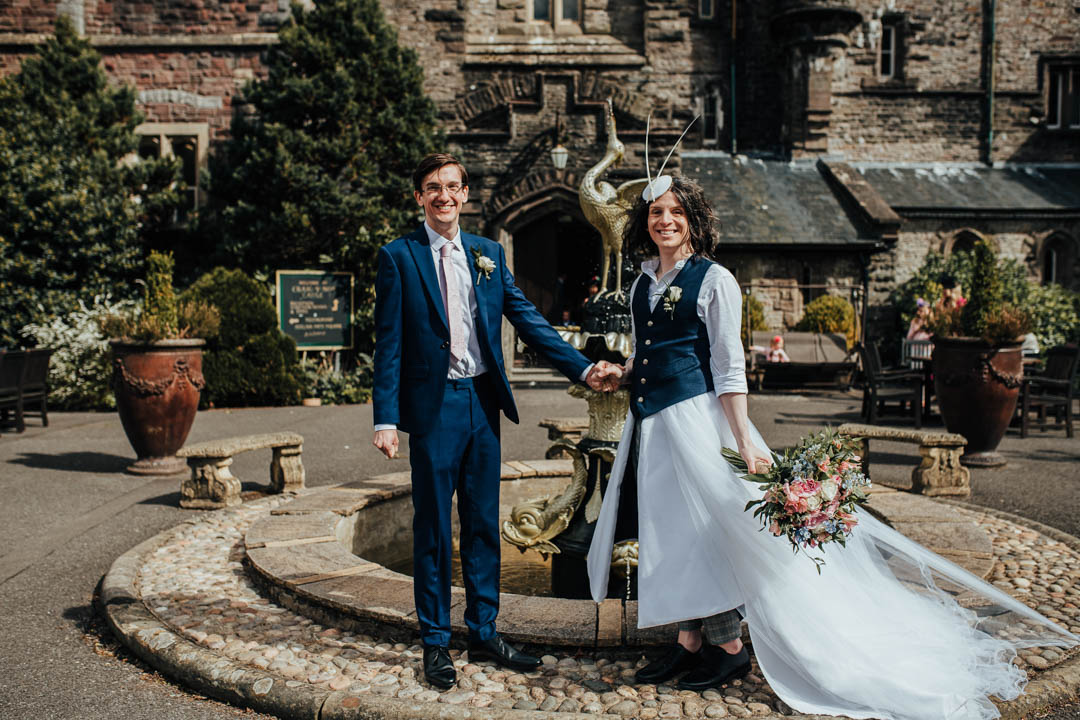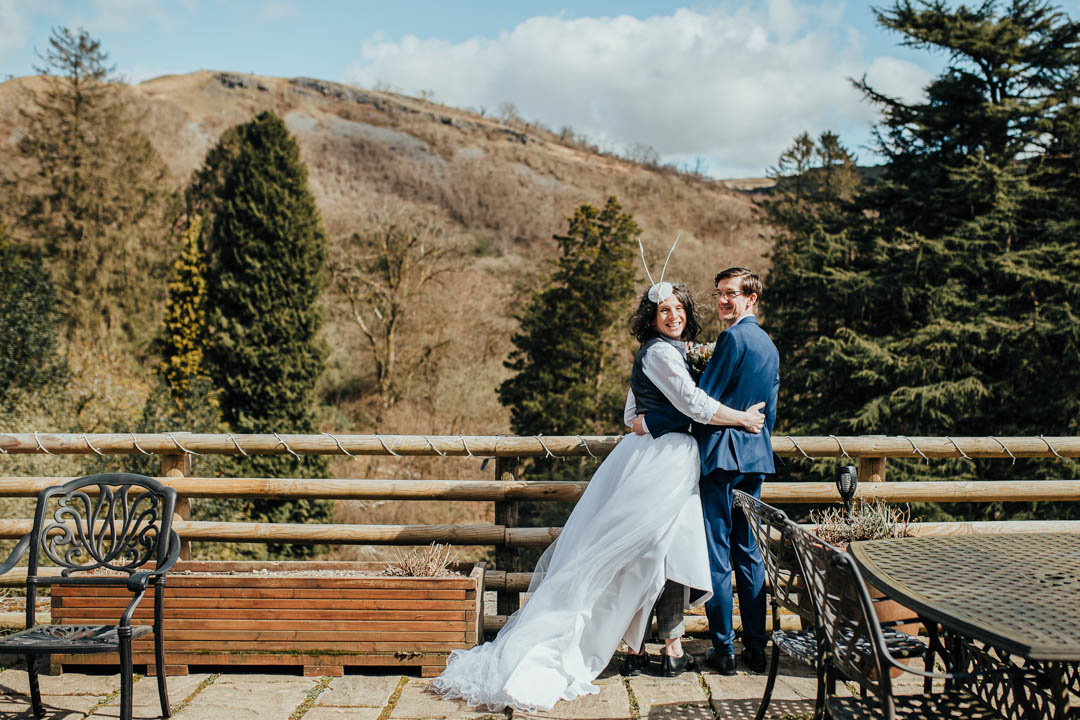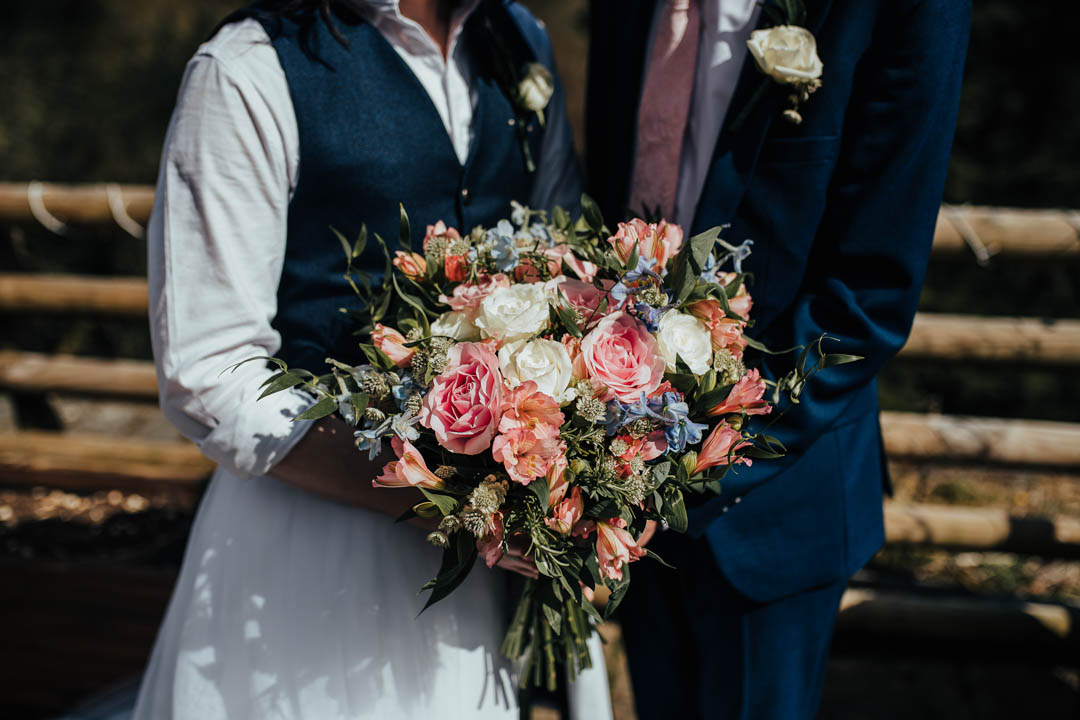
My husband and I got married in April 2022; I'm non-binary and he is gay. Our wedding was an unapologetic celebration of queer joy, community, and friendship that left our faces sore from smiling so much.
As great as the day was, planning a wedding as a queer couple came with some additional complications. Along the way we learned a lot, but these are the things it would have been most useful to know from the outset…
Traditional titles are highly gendered, but there are alternatives
Wedding scripts are usually saturated with references to the bride and/or groom. If neither label feels right, you have ample scope for improvisation. I decided to go with Bridegroom. While technically the unabridged version of groom, it isn't used all that often and felt ripe for a non-binary reinvention.
If this doesn't fit the bill, you could use your names in place of wedding titles or create new titles. When referring to both participants, gender-neutral options include the nearly/newly-weds and the happy couple. Where husband and/or wife might appear in the ceremony, these can be substituted with spouse.

To avoid gendered language, you may need to separate your legal marriage from the wedding ceremony
While many countries now legally recognize non-binary individuals, your government may not. Being from the UK, all our legal ceremony scripts contain references to a husband or wife, with no gender-neutral options. I didn't want to be misgendered in front of our nearest and dearest, so we had a legal ceremony in the registry office a month before the wedding. While not ideal, it gave us free rein to fully customize our ceremony and avoided any call-out costs for the registrar and officiant.
You are the ones evaluating venues/vendors, not the other way around
We were disappointed, but not surprised, that much of the wedding industry didn't cater to us. Not seeing your relationship reflected in the offerings of venues and vendors can really hurt. Businesses will catch up eventually, but don't let their lack of familiarity with queer people ever make you feel that you need their approval, or that your love isn't worthy of celebration. Our venue and vendors were amazing, non-binary friendly, and supported us wholeheartedly in creating the wedding we envisaged.
If you are struggling to find a specific statement of support for trans/non-binary couples, venues/vendors showcasing LGBTQ+ weddings in their literature are usually a safe bet. For venues, inquiring about their willingness to designate bathrooms as ‘all-gender' can be a useful litmus test.
[Pro-tip: The Offbeat Vendor Guide is the best way to find super inclusive vendors in your area!]

Communications about the wedding are an easy way to inform/remind guests you are non-binary and specify the language/pronouns to use
The pandemic has made it harder to maintain contact with friends and family and there may be guests who are unaware that you are non-binary. We decided to use our ‘Save the Date' cards to get everyone up to speed. These included our wedding titles and pronouns, along with a note mentioning that I'm non-binary. We didn't include these details on the invitation, but they appeared on our wedding website, and we provided them again one week before the wedding in an email confirming the arrangements.
Shaking up the wedding party can maximize support and minimize offense
Our wedding party contained individuals playing an active role in designing, leading, and supporting our ceremony. There was no Best Man, no Maid of Honour, just the people we knew had the flexibility and the expertise to make it a success.
Creating a hierarchy of the most important people in our lives feels unnecessary and can easily damage relationships. Uncoupling the inclusion criteria for the wedding party from how much we value the people involved lets us consider what we really need. Look for people who are good in a crisis, and who you can count on to make you feel good about yourself.

When selecting wedding attire, prioritize expressing your personality
You may wish to articulate your gender identity through elements of the look, but don't feel pressured to do so. A traditionally masculine or feminine ensemble will not make you any less non-binary.
A good wedding outfit expresses who you are, while being comfortable, fitting beautifully, and making you feel powerful and ready for anything. If, like me, you want something that blends the masculine and feminine, the modular nature of most formalwear affords considerable scope for balancing these elements to your liking.
The celebration of queer joy is a powerful form of activism
If you have guests who aren't familiar with LGBTQ+ issues, you may want to advocate for your community on the day. The celebration of queer love and happiness is a hugely powerful act of advocacy in and of itself, but there are plenty of opportunities for doing more if this feels right (e.g. donating to an LGBTQ+ charity in lieu of wedding favours). Some aspects of queer joy simply cannot be understood without reference to queer pain. These moments abound with LGBTQ+ relationships, and if they contextualise and accentuate your current happiness, don't feel you have to avoid them when describing your relationship.

Considering your guests' accessibility needs demonstrates your love and respect, and ensures everyone attending can focus on having a good time
Having an environment that accommodates you without you having to ask makes you feel seen, included, and worthy of consideration, sparing you from being reminded of your perceived otherness. Now that you are in charge, this insight is a gift that can transform your day in ways that include and empower everyone in attendance.
For us, the planning process was a journey from we want what they have to they're going to want what we have. Our unique insights can transform weddings for the better. Being forced to diverge from the usual way of doing things, while painful at times, prompted us to devise alternatives we truly believed in, which made our day even more special.
So, break some ground, make a little trouble, and create something no one will ever forget!









Thank you so much for writing this! It was an enlightening and empowering read. I especially appreciate this line:
“Some aspects of queer joy simply cannot be understood without reference to queer pain.“
Gonna keep that one in the vault for future use!